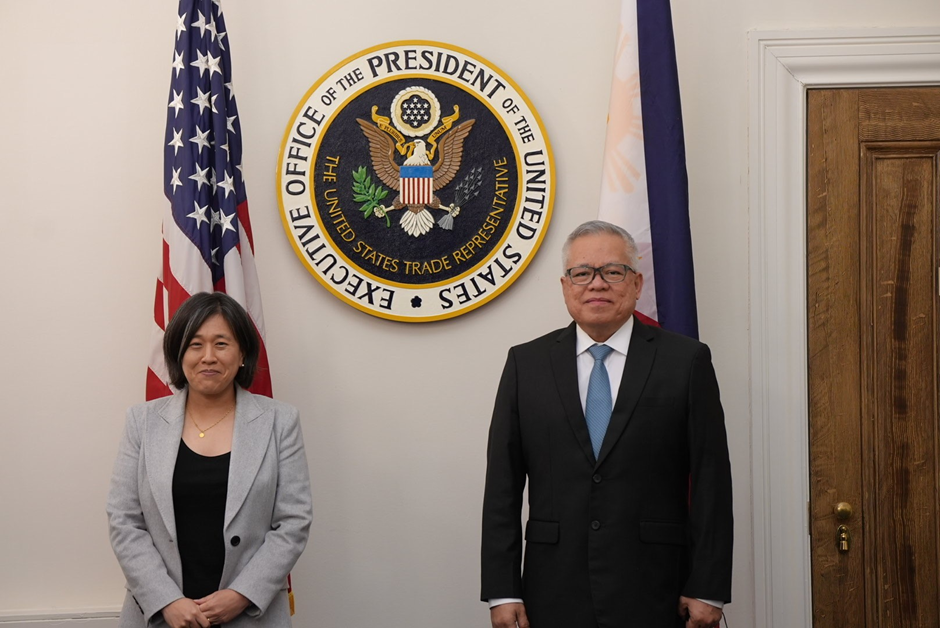
Washington, DC, United States – Philippine Department of Trade and Industry (DTI) Secretary Ramon M. Lopez and US Trade Representative (USTR) Ambassador Katherine Tai held a landmark bilateral meeting to discuss trade and investment issues, sectoral and industrial cooperation, and the trajectory of the PH-US economic relations during the Philippine trade delegation’s official trip to Washington, DC.
Lauding the significant accomplishments of both countries in the past 75 years of diplomatic engagement, Secretary Lopez highlighted the role of the Philippines-US Trade and Investment Framework Agreement (TIFA) as an effective mechanism in addressing issues of mutual concern, complemented by the Bilateral Strategic Dialogue (BSD) with the US Commerce Department.
According to the trade chief, both countries commit to strengthening trade access and facilitation and continued reforms that will create a better investment climate for investors under the TIFA.
The Trade Secretary also conveyed the Philippines’ support for the Indo-Pacific Economic Framework (IPEF) of the U.S. and expressed interest in joining the initiative. “In terms of the objectives of the IPEF, advancing resilience, inclusiveness, and competitiveness are aligned with the Philippines’ offensive interests,” Secretary Lopez added. Ambassador Tai mentioned in the Meeting that the Philippines is an important country in the Indo-Pacific and is welcome to join the initiative.
The Philippines likewise signified interest in the elements of the IPEF such as trade, MSME promotion and development, digital economy, supply chain resiliency, environmental sustainability, and investment in infrastructure. On the same note, the Philippines expressed its hope that the IPEF will aim to be more inclusive and have diverse participation from other interested countries in the region including the ASEAN.
The IPEF is the proposed vehicle for strengthened US economic engagement in the Indo-Pacific region, seeking to operationalize shared objectives around trade facilitation, standards for the digital economy and technology, supply chain resiliency, decarbonization and clean energy, infrastructure, worker standards, and other areas of shared interest.
There was also an exchange on trade priorities of both sides, with the Philippines explaining the recent legislative amendments pursued by the country. The Trade Secretary said, “We pursued major economic policy reforms, such as the amendments to the Retail Trade Law and the Foreign Investment Act, including the Public Service Act that essentially liberalized key sectors to allow greater foreign equity participation and attract more players and create more jobs while enhancing competition, that will lead to better services and more affordable costs for the people.”
The trade chief also relayed the increasing number of US data centers developers that cater to hyperscalers that are moving in and expanding in the country. “These also lead to more renewable energy capacities since renewable energy is the required source of energy for these facilities. These efforts are underway and will support building stronger trade and investment ties with the US,” explained Secretary Lopez.
The USTR emphasized the Biden administration’s worker-centered trade policy. The two Trade Chiefs expressed their shared commitment to upholding labor standards as an important aspect of trade.
Secretary Lopez and Ambassador Tai also discussed mutually beneficial market access improvement that will promote trade in goods such as in coal, electric vehicle, corn and chipping potatoes.
The Trade Secretary also expressed interest in the processing and packaging of Alaskan seafood. “The Philippines would be a good choice for processing and production of seafood from Alaska for re-export. The Philippines has extensive experience and competitive edge in terms of processing and toll packing, as exemplified by our engagement with the EU. This may assist in boosting agricultural trade between the US and Philippines.”
The Philippines’ interest in exporting pineapples to the mainland US was also pushed by Secretary Lopez with the Trade Secretary confirming the acceptability of the mitigating measures proposed by the US Animal and Plant Health Service (APHIS) for the entry of Philippine Pineapple. Both sides endeavored to discuss further on the next steps to be taken.
Both Secretary Lopez and Ambassador Tai affirmed their commitment to the shared objective of deepening and progressing the bilateral partnership between the Philippines and the US. The meeting was held on the sidelines of the High-Level Diplomatic Reception for Government Officials and Business Leaders in Washington, DC. Secretary Lopez was joined by DTI Undersecretary for Industry Development and Trade Policy Group (DTI-IDTPG) Ceferino Rodolfo, Commercial Counselor Kenneth Yap, and Consul Commercial Benedict Uy. In 2021, the US was the Philippines’ 3rd largest trading partner (out of 223), top export market (out of 205), and 5th largest import supplier (out of 210). Total bilateral trade with the US reached USD 19.6 billion, with the Philippines enjoying a modest trade surplus. The US was also the Philippines’ 5th largest investor in the same year with approved investments amounting to USD 77.64-M. ♦
Date of Release: 19 April 2022



